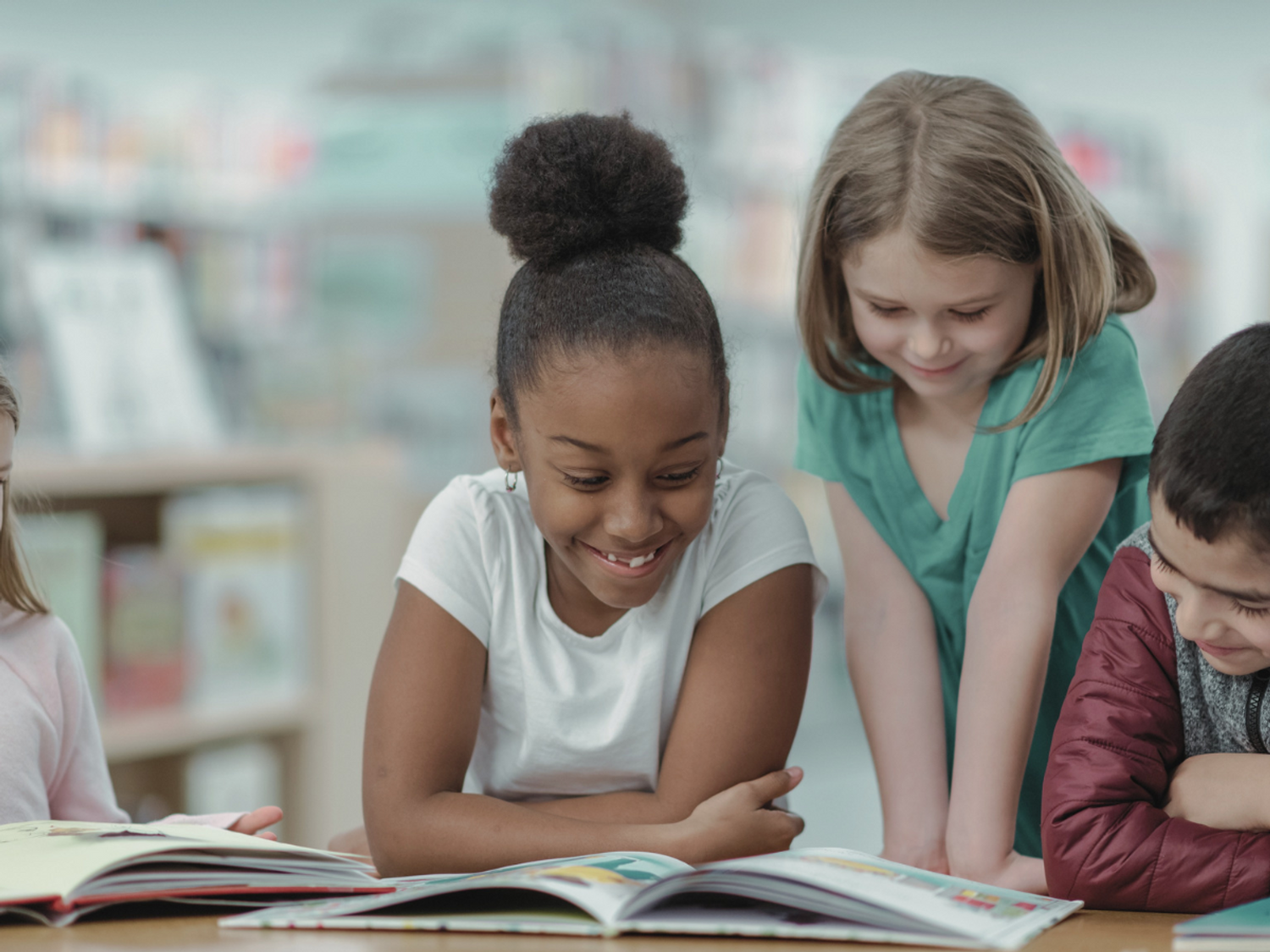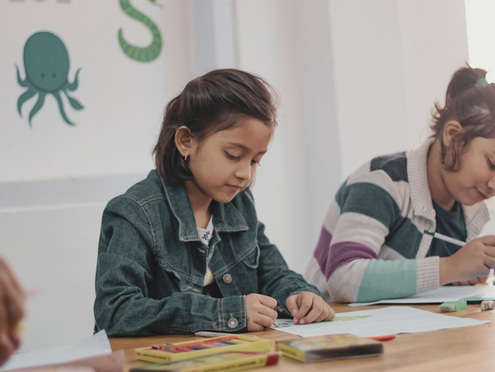The literacy skills that children learn at primary school lay the foundation for everything that follows, from doing well in lessons and socialising with classmates to succeeding in their careers and personal lives as adults.
Find out more about the benefits of learning literacy and how you can teach it effectively in the classroom below.
Why is learning literacy at a young age important?
Developing literacy skills at a young age is important for a number of reasons:
- It gives children the capacity to comprehend new information and build on what they already know. It also helps them to develop a rich vocabulary and the ability to express themselves, which will help them to become skilled and successful individuals.
- Literacy skills help children to communicate their ideas and emotions, both face-to-face and via a range of written media.
- Exposure to stories and media about different experiences and cultures helps children to develop socially as well as intellectually. This allows them to make sense of new experiences and differing perspectives as they encounter them in life.
Research by the Literacy Trust shows that children who are engaged with literacy have better mental well-being than those who aren’t. As a result, learning to value literacy at an early age can have an impact on their general happiness and mental health.
The “youth” element here is important, too! When children start primary school, their brains are still going through a key stage of their development. This is a crucial time for developing literacy skills and what children learn at this age can set a pattern for future learning. Furthermore, if they learn to love reading and writing early on, they can build skills and habits that will serve them well throughout their education and beyond.
While literacy learning begins from the earliest years (e.g. parents reading stories to their children), primary school plays a vital role in giving children the skills needed to thrive.
How do literacy skills enhance children’s performance throughout school?
When it comes to succeeding in an educational setting – including primary school, secondary school and beyond – literacy plays a key role across all subject areas.
Literacy skills are crucial for understanding and following instructions, lesson concepts, learning objectives and assessment requirements. They’re necessary for expressing oneself in the classroom and asking questions. They’re also fundamental for engaging with a wide range of sources throughout one’s time at school.
Such skills are vital for all areas of education. They unlock access to the wider curriculum, encourage critical thinking and prepare children for lifelong learning. This applies to reading, listening and speaking, and writing skills in different ways.
The impact of reading in primary years
Reading skills developed during primary school will serve learners throughout their lives, giving them the ability to comprehend the texts they encounter. Literacy also exposes learners to new ideas, perspectives and vocabulary across subject areas while helping them to develop their attention span and concentration skills.
One key outcome in a school setting is that strong reading skills help children to understand and follow written instructions, including when sitting exams (since most of the assessment they will face involves reading). Studies have shown that reading comprehension can help children grasp and answer maths word problems (Vilenius-Tuohimaa et al., 2008), for example. Likewise, Cromley (2009) suggests that literacy is important in the sciences.
By contrast, poorer reading ability has been linked to negative life outcomes. Dugdale and Clark (2008), for example, state that around 25% of young offenders have reading skills below those of the average seven-year-old.
This isn’t to say that poor literacy skills lead directly to a life of crime, of course! There are too many other factors to make such a connection. However, it is true that children who struggle with literacy may face difficulties across multiple subject areas, which may lead to frustration with the education process. This can, in turn, contribute to further difficulties outside of school and in their post-school lives.
Speaking and listening in primary years
Speaking and listening are also foundational skills for children to develop during primary school.
Listening, for example, helps children to develop concentration skills so they can follow and understand what speakers are saying. This is important for comprehending lesson content and instructions in class. It also means learners can understand the rules and routines that teachers set out, helping them to contribute to a productive classroom environment.
However, speaking skills are also required for learners to respond to questions in class. Learners who are better able to rationalise their ideas and express their feelings – whether contributing to a group classroom discussion or talking to a teacher about challenges they’re facing – will be better equipped to overcome obstacles across a range of subject areas.
In addition, conversational skills are important for collaborative learning with other students, such as talking about lesson content in class or taking part in a group project.
The benefits of developing verbal communication skills are also backed up by research. For instance, an ESU (2013) study with children aged 7 to 9 has shown that when learners are given more opportunities to develop their speaking and listening skills, they perform better on average on standardised testing compared to other children.
Developing writing skills in primary years
Writing is another literacy skill that can benefit learners across the curriculum.
At a basic level – like speaking – writing is one way in which children can express their ideas and feelings in a school setting. And being able to do this will help them take part in lessons and discuss their educational needs more effectively.
But writing also helps children practise other communication skills, such as spelling, punctuation, grammar and organising information coherently for a reader.
Writing may also take in a wide range of text types, from argumentative essays to stories. It helps learners to think more about how they use language, including their use of vocabulary and tone. This emphasis on planning and careful composition can be transferred to other subject areas later in their school lives, such as developing a research project.
Moreover, most areas of the curriculum are assessed via written tests. Being able to write well is essential for achieving strong academic results. And while this is already important in primary school, it becomes even more vital in secondary school, college and university, which require learners to compose increasingly complex texts.

Improve literacy in primary school
Individualised, optimised literacy instruction for learners aged KS1-5.
How do literacy skills set up learners for life?
Literacy skills are also important for life outside the classroom. The reading, writing, speaking and listening abilities children develop in primary school can have profound effects on many areas of their lives, including the following:
- Self-esteem – From understanding new words to communicating their feelings, strong literacy skills help children to make sense of the world around them, tackle new challenges and keep up with their peers in class. This provides a base level of confidence and independence required to thrive elsewhere in life.
- Social skills – The communication skills that children develop in primary school are vital for forming and maintaining social relationships. This is when children first learn the importance of listening and communicating clearly for forming friendship groups, socialising with peers and negotiating disagreements, and these are things that they will need in a variety of settings throughout their lives.
- Decision-making – In a world where we’re often overwhelmed with information, literacy skills (and the ability to read and assess different sources) can be vital for making good decisions. One key example of this is health literacy, where being able to access and understand medical content can be crucial for making informed decisions about one’s health and well-being.
- Career prospects – Employers typically value literacy skills highly, so falling behind at a young age can impact children’s future career prospects. In addition, poor literacy skills as an adult may also affect how much someone can earn.
- Empathy – Literacy can help children develop empathy, especially via reading books. Stories teach young children about many aspects of life, from family and growing up to the importance of the environment and other cultures. By broadening their horizons via literature, children can become more understanding and respectful of the needs of others.
A lack of literacy skills, by comparison, can have negative impacts on all of the above.
Strategies for teaching literacy in the primary classroom
So, how can teachers help learners develop key literacy skills in the primary classroom? The best solutions will, as ever, depend on the situation. However, there are some basic things you may want to consider when it comes to literacy and oracy across subject areas.
Give learners chances to practise literacy skills
The most important thing any teacher in any subject area can do to foster key literacy skills is give learners the chance to speak, listen, read and write in class:
- Listening and speaking – Do your lessons give learners opportunities to speak and listen in the classroom (e.g. explaining their ideas to others, group work, discussing solutions to problems)? If not, how could you introduce more chances to do so?
- Reading and writing – What opportunities do learners have to practise reading and writing skills in class? Could you introduce more chances to read and summarise information from a range of sources? Are there ways to introduce more discussions about similarities and differences between texts (e.g. the differences between factual writing and persuasive or argumentative writing)? Are children asked to produce a range of text types in class (e.g. presentations and posters)?
Whatever the subject or topic, there will usually be a way that you can encourage children to use and develop these vital literacy skills in class. And if you’re worried that learners aren’t getting enough chances to do this, it’s certainly worth exploring other possibilities!
One way to do this is to speak with your colleagues. Other teachers in other subject areas may have ideas that you can integrate into your own lesson plans. Collaborative teaching across different parts of the curriculum can be beneficial for all involved - Bedrock Mapper's created content area is a great way for teachers across the school or trust to do this.
But to get you started, you might also want to try some of the suggestions below.
Techniques for teaching literacy in primary school
There are some simple techniques that teachers can use to encourage learners to use (and take an interest in) literacy skills in the classroom. Take the following, for example:
Making learning a game
It can be hard to get young learners interested in topics like phonics, grammar and vocabulary. However, gamifying the process can make it more engaging for some children. This might involve coming up with games to play (or using pre-existing apps and games), but it could be as simple as reframing existing activities in some way: e.g. giving children a “mission” for which they can earn “points” may be more exciting than giving them homework that will be marked!
Focus on vocabulary
Whatever the subject area, you can try to introduce a few new words into lessons each day. This will help learners expand their vocabularies, giving them resources to read and learn independently going forward. Remember, though, that it’s important to use scaffolding techniques to help children retain new words that they learn (simply using them once won’t be effective for some).
Use role-play
Role-play is a great way of giving learners opportunities to speak and listen in class. It also gives teachers a chance to model the kinds of conversations and skills they want learners to practise.
Introduce a range of texts
Giving learners chances to engage with a wide range of texts provides more opportunities for understanding how language is used in different ways. From fiction and non-fiction stories in different genres to plays, poetry and graphic novels, the more time learners spend engaging with different text types, the more likely they are to find something that sparks their interest in literacy.
Finally, one of the best things a teacher can do to encourage literacy is to lead by example! Make sure learners know that you love reading and writing. Talk to them about your favourite books from your childhood. Read aloud with them. Engage them in conversation in class.
The more you can create a language-rich environment in your classroom, the more likely learners are to develop strong literacy skills (and an appreciation thereof) early on.
Bedrock Learning is helping schools transform learning and literacy
Bedrock Learning’s core curriculum is a literacy improvement program designed to help students develop the necessary skills to become successful readers and writers. Through its innovative approach, Bedrock offers a comprehensive, interactive, engaging learning experience that helps students transform their literacy skills. Learners explore individualised grammar, vocabulary and disciplinary literacy content, reinforcing holistic literacy improvement.
Students improve their learning through literacy through encounters with real-world examples of how reading and writing can be used in everyday life, such as through Bedrock’s bespoke fiction and nonfiction prose.
With Bedrock Learning's comprehensive approach, students gain the knowledge they need to improve their literacy skills and become lifelong learners.



